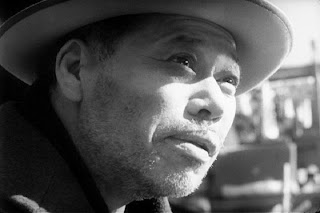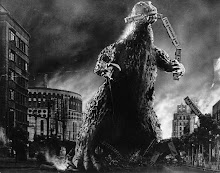
Exit Through the Gift Shop (2010)
The Gist:
So I already mentioned that I had seen the film before in Boston, but I did want to take the opportunity to see it again. I have to say, this film is an honest contender for my favorite of the year (I think the only film that can potentially beat it out at the moment is A Town Called Panic). It's just so fascinating, it manages to be a movie about so many things all at once. It's a film that captures the beginnings of street art movement and subsequently street art's assimilation into mainstream commercialism. It's a film about both Banksy and Thierry as individual personalities. And finally it's a film about the nature of art, and the implications of art's relationship with society, how the ravenous consumption of art changes it into something else. Of course, I find it appropriate that Thierry's “Mister Brainwash” was making direct references to Andy Warhol, and that Banksy referred to him as the true successor to Andy Warhol in a lot of ways, because the ideas of Warhol really are expounded upon in Thierry's work. I think if there's any chance that the film is a fake or a partial fake, it has something to do with that inherent connection to Warhol. Not only are the artistic sensibilities of Thierry linked to the man, but the exploitation of promotion and commerce are completely in line with what Warhol was doing in the art scene as well. Either the connection is one of those bizarre coincidences (because through the film you get the impression that Thierry is not fully aware of the extent of that connection between him and Warhol) or it's a clever ruse concocted by the filmmakers. I tend to believe that the film is a legitimate non-fiction effort, agreeing with a reviewer at the Boston Globe who noted that the film was too perfectly weird and bizarre to have ever been made up. However, if there was hoax involved in the film, I would think that it was only involved with the Mister Brainwash gallery and that the rest of the film (and Thierry's character in particular) was real. I can believe that Banksy cleverly set up the gallery as a way to provide a narrative punch to the film, a statement about the art scene. However, Thierry feels to real for me to think he was a character. In fact, all of it feels pretty real to me, on an instinctual level. That's just my opinion though.
On Another Note:
The Gist is that long because I saw this again for an extra credit assignment for my doc class and had to write a one-page response and I figured I would just post that here. Also the picture isn't from the film itself, but from street art found by Banksy at Sundance on the day of the film's premiere (kind of cool).






+8.jpg)











.jpg)



_06.jpg)












_4.jpg)








